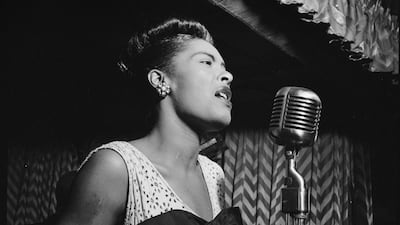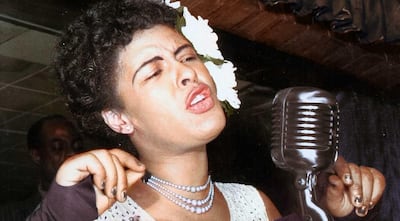A Bafta-longlisted, Dubai-produced documentary about the life of the notable but troubled jazz singer and civil rights activist Billie Holiday finally lands in the UAE this weekend, with screenings at Cinema Akil in Dubai.
The film’s journey from festival favourite to public screens has been almost as tumultuous as the life of the star it focuses on.
Billie, from Emmy-nominated British documentarian James Erskine, took its festival bow to a warm reception at the Telluride Film Festival at the end of 2019, and was scheduled for release in global cinemas in June last year.
Covid-19, of course, had other plans, and the release was put back to November. This, too, fell by the wayside, thanks to the coronavirus, as its UK release was curtailed at the preview stage by the announcement of a second lockdown, while a planned glitzy red-carpet premiere in Dubai, home to its producer Barry Clark-Ewers, was also halted in the same month. An anticipated December release similarly failed to materialise.
Director Erskine admits the journey has been a frustrating one. "It was sort of miserable," he tells The National. "We managed one night of previews in the UK before the second lockdown was introduced, and around the same time James Bond [No Time to Die] pulled from releasing, so a lot of cinemas in the US just closed as people weren't going."
Nonetheless, the upbeat director prefers to focus on the positives. “We’ve had some successes, too. We’ve managed some openings where cinemas have been open – France, Switzerland, Norway, Finland, Thailand – and it’s done really well. It’s also performed well digitally and critically, and this has happened to everybody, so it’s hard to feel too hard done by.”
Billie tells the story of Holiday's fascinating yet tragic life through an impressive feat of archiving and repurposing more than 200 hours of taped interviews with key figures from Holiday's life and career, including jazz contemporaries such as Tony Bennett and Count Basie.
The interviews were originally recorded in the 1970s by journalist Linda Kuehl for a biography that was never completed. In an uncanny mirror image of Holiday herself, Kuehl died young in mysterious circumstances, with her life’s work incomplete, and the tapes had long been thought lost.

Erskine credits his producer Clark-Ewers for the sterling detective work that unearthed the historical goldmine gathering dust in the house of a collector, and says that as soon as they listened to the first tape, he knew they had found something remarkable.
“We went to a studio in Chelsea with this shoe box full of tapes, and said ‘OK, let’s listen to Charlie Mingus first.’ Straight away we were transported to the 1950s and he was describing being on stage with Billie. It felt pretty special.”
The sense that he had found something special also inspired Erskine in terms of how he would approach the film. Holiday had died long before the tapes were made, in 1959, an apparent victim of her triple addiction to alcohol, narcotics and an abusive relationship.
“There was a different kind of eyewitness perspective that we hadn’t heard before, from people who actually knew her rather than secondhand from some jazz historian,” he explains.
“When we actually laid out the film, that was our guiding principle through the 150 interviews. People were only allowed to talk about an event or relay a conversation that they’d actually had with Billie Holiday. So through the very medium of their voice you’re able to populate that world, almost by imagination.”
Looking back at Holiday’s life in 2021, it seems strange that she remains a relatively unknown figure outside of music aficionado circles. She carved out a successful career spanning three decades from the 1930s to her untimely death in 1959. She played a huge role in bringing jazz to mainstream audiences, playing record-breaking sell-out shows at huge venues such as New York’s Carnegie Hall, which would normally be the home of successful white artists.
She was also a dedicated civil rights activist – her father died after being refused medical treatment because of the colour of his skin, and her lyrics frequently referenced the treatment of African-Americans both historically and in her own era.
Her tortured life and tragic death, when she was penniless – having been swindled out of her career earnings – and handcuffed in a hospital room by the Federal Bureau of Narcotics, is in itself enough for a movie to make you weep. So far, however, she has by and large escaped the attention of Hollywood, despite its current love affair with biopics of troubled musicians.
Diana Ross played Holiday in 1972's Lady Sings the Blues, but more recently the star's name does not seem to carry the same traction as peers such as Bennett or Louis Armstrong, or the same Hollywood biopic bankability as Elton John or Freddie Mercury.
Erskine seems unsurprised that Holiday’s name is not more familiar globally. After all, he notes, she was a black woman in an era of racial segregation, and in a country where women were not even allowed a credit card in their own name until 1971.
Perhaps Billie can help go some way in redressing this ignorance of one of the first half of the 20th century's most significant, if not instantly recognisable, cultural figures?
Ewers is convinced Dubai audiences will find plenty to enjoy, and learn, in the film, regardless of whether they’re familiar with the artist or avid fans of jazz. “Even if you don’t know who Billie Holiday is, it’s a very contemporary story,” he says.
"Sometimes when you're watching black and white footage it can automatically give you the impression that it's not relevant anymore, but when you watch Billie, and you see how beautifully restored and colourised a lot of these sections are, that does make it feel more contemporary.
“That’s important, because this might have been 75 years ago, but it’s talking about a lot of very relevant issues, which a lot of people around the world are still facing.”
Billie is showing at Cinema Akil, Dubai, from Friday, February 19



